The debut EP from the UK metalcore revivalists is a triumph of concision. Whatever you like about the genre, you can find it here.
Metalcore is experiencing a surprising, unprecedented era of critical cachet, all without ceding an inch toward “good taste.” Whether it’s splatterhouse gore, WWE entrance music, MySpace emo, great southern trendkills, or “Bring Me to Life” revival, this 21st-century subculture has already proven to be fertile roots music. Amid this wave of extremists and specialists, Heriot make for a curious Next Big Thing. The Midlands quartet hadn’t developed much of a reputation prior to the pandemic; a string of early releases was followed by a four-year hiatus and the addition of guitarist/vocalist Deb Gough in 2020. Gough’s presence infused Heriot with greater instrumental flexibility and, more importantly, charisma: From their reboot single “Cleansed Existence,” it was clear that Heriot had it, even if that quality couldn’t be reduced to sonic signifiers. With Profound Morality, it’s easier to define—whatever it is you find intriguing about metalcore, you’ll find it here.
More than their peers, Heriot maintain a healthy degree of respect toward the genre’s formative figures. The cover’s font and blurred, igneous imagery hearkens back to Roadrunner’s 1990s commercial peak, and in late 2021, Heriot made good on the title of “Ten Ton Hammer,” a cover of the 1997 hit from Machine Head—a key liaison between groove- and nu-metal, and also subject of some of the era’s most withering reviews in Heriot’s native UK. Gough has the chops of a Guitar World guest columnist but can also be found jamming along with Turnstile on her Twitter account. Numerous writeups of Heriot’s guitar tones have assumed the reader is familiar with Boss’ HM-2 pedal, in the same way hip-hop critics will namedrop the 808 drum machine—the sound of a formative piece of “golden age” equipment whose sonic character remains timeless.
And so it’s fitting that instrumental opener “Abaddon” evokes one of the most memorable instances of early ’90s futurism, the final scene of Terminator 2 where Arnold Schwarzenegger gets lowered into a vat of smoldering steel, obscured by chains—the sound is metal, some of it cybernetic, some of it forged from steel, all of it merging towards a molten end. And immediately afterwards, “Coalescence” imagines the T800 reemerging as an amoral killing machine, the track itself a self-contained syllabus of everything Heriot has done and will do through Profound Morality: bionic percussion, blast beats, vocals that span blackened, death and goth metal, tempos alternating between sludge and speed.
With eight tracks in about 20 minutes and judicious use of silence, Profound Morality is a triumph of concision, Heriot concentrating the overwhelming effect of past masters who were far more reliant on sprawl and space. “Abaddon” and the title track miniaturize Godflesh’s colossal, cautionary tales of machine turning against man. Rather than compartmentalizing metalgaze, the flagrant thrash of “Enter the Flesh” is covered with a layer of gauze equally steel and wool. Gough’s vocals occasionally edge towards the haunted forests of doom-folk and Deftones’ drug dens and quickly find their way out. At any given moment, Profound Morality presents as maximalism, but taken as a whole it’s a work of restraint and craft—a band whose shapeshifting happens organically rather than as a series of jarring growth spurts.
At times the band betrays its interest in influences outside of metalcore, as the erratic pulses and ambient synth washes of “Mutagen” and “Abattoir” could’ve been smuggled onto the more confrontational and abstract stretches of Arca’s KICK series. The band’s voice is also in a state of development: The lyrics themselves are mostly vivid, tactile ways of making explicit what the music itself implies (“blood soaked brick, meaningless living,” “scorned by the blaze of death,” “Feel the wrath of mass terror”). While a weighty statement on its own, Profound Morality arrives as only a teaser of their boundless potential—the past, present, and possible future of metalcore.





%20Music%20Album%20Reviews.webp)










0 comments:
Post a Comment